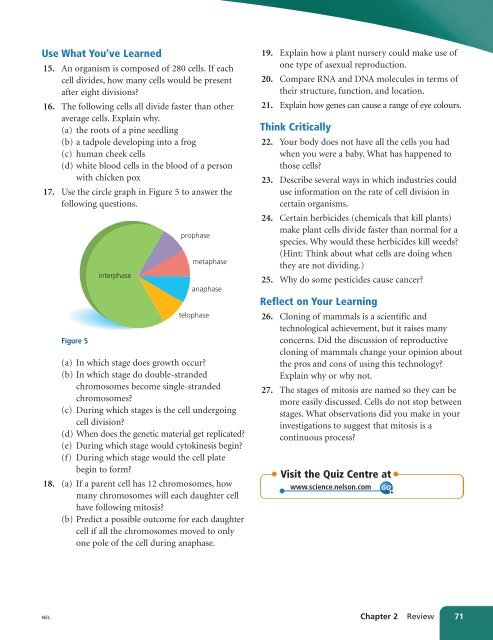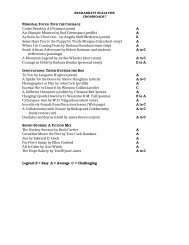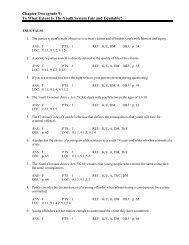Unit A Reproduction
Unit A Reproduction
Unit A Reproduction
Create successful ePaper yourself
Turn your PDF publications into a flip-book with our unique Google optimized e-Paper software.
Use What You’ve Learned<br />
15. An organism is composed of 280 cells. If each<br />
cell divides, how many cells would be present<br />
after eight divisions?<br />
16. The following cells all divide faster than other<br />
average cells. Explain why.<br />
(a) the roots of a pine seedling<br />
(b) a tadpole developing into a frog<br />
(c) human cheek cells<br />
(d) white blood cells in the blood of a person<br />
with chicken pox<br />
17. Use the circle graph in Figure 5 to answer the<br />
following questions.<br />
Figure 5<br />
interphase<br />
prophase<br />
metaphase<br />
anaphase<br />
telophase<br />
(a) In which stage does growth occur?<br />
(b) In which stage do double-stranded<br />
chromosomes become single-stranded<br />
chromosomes?<br />
(c) During which stages is the cell undergoing<br />
cell division?<br />
(d) When does the genetic material get replicated?<br />
(e) During which stage would cytokinesis begin?<br />
(f) During which stage would the cell plate<br />
begin to form?<br />
18. (a) If a parent cell has 12 chromosomes, how<br />
many chromosomes will each daughter cell<br />
have following mitosis?<br />
(b) Predict a possible outcome for each daughter<br />
cell if all the chromosomes moved to only<br />
one pole of the cell during anaphase.<br />
19. Explain how a plant nursery could make use of<br />
one type of asexual reproduction.<br />
20. Compare RNA and DNA molecules in terms of<br />
their structure, function, and location.<br />
21. Explain how genes can cause a range of eye colours.<br />
Think Critically<br />
22. Your body does not have all the cells you had<br />
when you were a baby. What has happened to<br />
those cells?<br />
23. Describe several ways in which industries could<br />
use information on the rate of cell division in<br />
certain organisms.<br />
24. Certain herbicides (chemicals that kill plants)<br />
make plant cells divide faster than normal for a<br />
species. Why would these herbicides kill weeds?<br />
(Hint: Think about what cells are doing when<br />
they are not dividing.)<br />
25. Why do some pesticides cause cancer?<br />
Reflect on Your Learning<br />
26. Cloning of mammals is a scientific and<br />
technological achievement, but it raises many<br />
concerns. Did the discussion of reproductive<br />
cloning of mammals change your opinion about<br />
the pros and cons of using this technology?<br />
Explain why or why not.<br />
27. The stages of mitosis are named so they can be<br />
more easily discussed. Cells do not stop between<br />
stages. What observations did you make in your<br />
investigations to suggest that mitosis is a<br />
continuous process?<br />
Visit the Quiz Centre at<br />
www.science.nelson.com<br />
GO<br />
NEL<br />
Chapter 2 Review 71

















